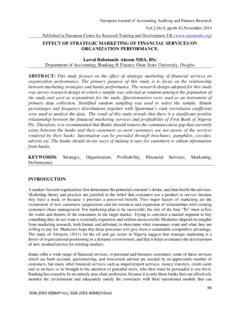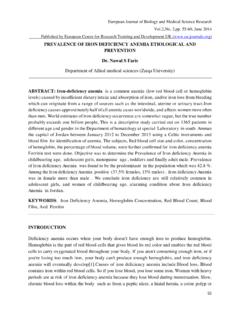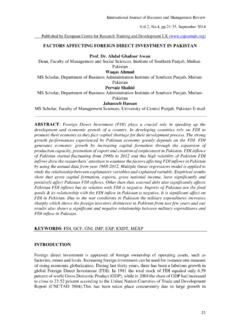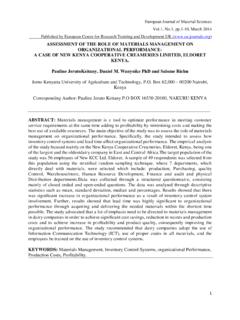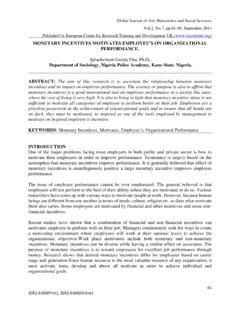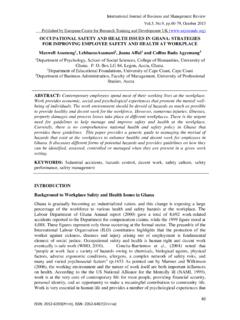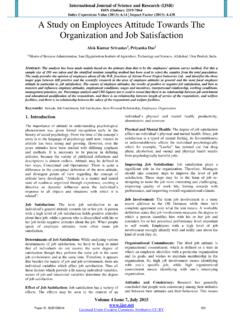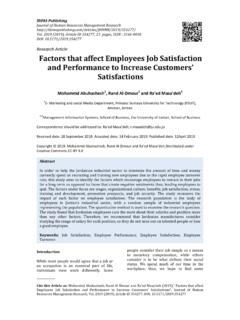Transcription of IMPACT OF EMPLOYEE JOB SATISFACTION ON THEIR …
1 Global Journal of Human Resource Management , , , December 2014. Published by European Centre for Research Training and Development UK ( ). IMPACT OF EMPLOYEE JOB SATISFACTION ON THEIR A. CASE STUDY OF BANKING SECTOR IN MUZAFFARGARH DISTRICT, PAKISTAN. Prof. Dr. Abdul Ghafoor Awan, Dean, Faculty of Management and Social Sciences, Institute of Southern Punjab-Pakistan. Iffat Asghar Ms Scholar, Department of Business Administration, Institute of Southern Punjab, Multan, Pakistan. ABSTRACT: Everybody knows that successful implementation of any strategic objective depends on the inspiration and hard work of the company employees. Researches indicate that satisfied employees are the major asset and source of any bank for successful achievement of its short-term and long-term objectives. The present study investigates the link between job SATISFACTION with the job salary package, job security, and reward system, and IMPACT of this SATISFACTION on employees' job performance in banking sector of Muzaffargarh District, Pakistan.
2 Data is gathered randomly from sample of 150 employees selected from 10 branches of different banks situated in Muzaffargarh District. Descriptive statistics have been applied to check the relationship between two variables (job SATISFACTION and job performance. The results of study indicate that the relationship between job SATISFACTION and job pay package, job security, and reward system is positively correlated. And the IMPACT of this SATISFACTION is direct and significant on employees' job performance. KEYWORDS: Job SATISFACTION , EMPLOYEE pay package, Job security, Reward system, Job Performance . INTRODUCTION. Overview of Banking Sector Both, the private and public banking sectors of Pakistan have a long history of catering the financial and economic needs of the nation. A few decades ago, only a few banks existed in the country. THEIR operations were very traditional, simple and limited.)
3 They normally used traditional and manual systems of banking. The number of THEIR customers was very small. However, with the wave of globalization and rising market demands, the banking sector of Pakistan moved to tremendous transformation from the traditional banking to modern during last decade due to technology induction and product innovations. A major shift was the exponential growth private banks. At present, different international and well-established 71. ISSN 2053-5686(Print), ISSN 2053-5694(Online). Global Journal of Human Resource Management , , , December 2014. Published by European Centre for Research Training and Development UK ( ). domestic banks are operating in Pakistan and are providing latest banking services to THEIR customers. Satisfied employees are the major element to the success of banking sector in any country of the world. Public or Private sector banks and the employees have long been concerned with the constructs of job SATISFACTION and its IMPACT on job performance, because this variable has strong influence on the overall performance of banks.
4 Thomas Wright (2009) has found that when employees have high levels of psychological well-being and job SATISFACTION , they perform better and are less likely to leave THEIR jobs. Satisfied employees are not only good and effective performers but also efficient ambassadors of THEIR banks. They may bring heavy deposits and well-reputed customers to THEIR bank while unsatisfied employees may not. Only satisfied employees are loyal to bank and may attract the outside business to THEIR bank. Research Problem The research problem of this study is to find out the IMPACT of employees' job SATISFACTION (in the areas of job pay package, job security, and job reward system) on THEIR performance in the banking sector of Muzaffargarh District, Pakistan. Problem Statement How does the efforts made by banks to raise THEIR workers job SATISFACTION practically work? To what extent banks are successful in satisfying THEIR workers for THEIR pay packages, job security and reward system?
5 How employees' job SATISFACTION influence THEIR job performance? This study is conducted to find out the answers of these questions. Objectives of Study The objective of this study is to find out the IMPACT of EMPLOYEE job SATISFACTION on THEIR job performance. More specific objectives are outlined in the following: 1. To determine strength of relationship between EMPLOYEE pay package and EMPLOYEE job SATISFACTION . 2. To ascertain nature of relationship between EMPLOYEE job security and EMPLOYEE job SATISFACTION . 3. To study the link between EMPLOYEE reward system and EMPLOYEE job SATISFACTION . 4. To measure the IMPACT of EMPLOYEE job SATISFACTION on EMPLOYEE job performance. 5. To suggest ways to further enhance the workers SATISFACTION for THEIR job and that will, in return, result in rise THEIR work performance. LITERATURE REVIEW. A large number of researchers have proved the importance of job SATISFACTION of employees in business organizations.
6 Scholars like Brown (1996), Peiro (1999), and Hunter & Hunter (1984). considered the job SATISFACTION and job performance relationship a prerequisite for higher productivity of organizations. Sowmya and Panchanatham (2011), Argyris (1964), Likert (1961), and McGregor (1960) contend that satisfied bank employees are the reason for higher productivity, higher involvement and a less likelihood of resignation. Harrison, Newman &. Roth (2006), Schleicher, Watt, & Greguras (2004), and Gupta & Joshi (2008) emphasized job 72. ISSN 2053-5686(Print), ISSN 2053-5694(Online). Global Journal of Human Resource Management , , , December 2014. Published by European Centre for Research Training and Development UK ( ). SATISFACTION as an important technique used to persuade the employees to work harder as "A. HAPPY EMPLOYEE IS A PRODUCTIVE EMPLPOYEE .While Mullins (2005) opposes by arguing that job SATISFACTION is a complex and multifaceted concept meaning different things to different people.
7 He considered it more of an attitude, hence may be an internal state that can be measured quantitatively or qualitatively. Siebern-Thomas (2005) and Clark (1999) maintained that the correlation between wage and job SATISFACTION is significant and positive. Cabral Vieira (2005) argued that low-pay workers are likely to have low-quality jobs and consequently less job SATISFACTION and vice versa. Same is followed by Luddy (2005) that employees earning the lowest income report significantly lower levels of job SATISFACTION . Then Nguyen, Taylor & Bradley (2003) reveal that income is an important determinant of job SATISFACTION . Frederick Hertzberg proposes in his motivation-hygiene theory that intrinsic factors are related to job SATISFACTION and motivation, whereas extrinsic factors are associated with job dissatisfaction. In 1965, Adams stated in his Equity Theory that pay SATISFACTION is determined by an EMPLOYEE 's perceived input-outcome balance.
8 Employees are satisfied if payment is equal to THEIR hard work, and vice versa. Later on, Locke (1965) followed the same in his Discrepancy theory by describing that SATISFACTION is determined by the difference between the employees' desires and earning. Then Lawler (1971) also followed in his Model of Determinants of Pay SATISFACTION by saying that pay SATISFACTION is determined by the difference between actual pay and the expected pay. He identified two factors: (a) perceived amount that should be received and (b) perceived amount actually received. When a = b => SATISFACTION . When a > b =>dissatisfaction, and when a < b => inequity, and discomfort. Several reasons are there for increasing work on job security. One of them is the large number of people who were unwillingly unemployed during the 1980s. Herz (1991) found in his survey that about million people were permanently displaced between 1985 and 1989 alone.
9 Ashford et al (1989), Davy, Kinicki, Kilroy & Scheck in 1988 have pointed out the increasing frequency of organizational restructuring and merging and job insecurity. While Bennett (1990). studied the topic of growing concern over worker obsolescence and technological displacement. Then, over the past decade, many people like Greenhalgh & Rosen-Blatt (1984), Ashford, Lee & Bobko (1989), Roskies & Louis-Guerin (1990), Greenhalgh & Sutton (1991), Jacobson (1991), Borg & Elizur (1992) focused on the relationship between job security and EMPLOYEE work attitudes and behaviors. Pfeffer & Baron (1988), Davis-Blake & Uzzi (1993), Matusik &. Hill (1998) studied that temporary employees may be hired during the peak period and subsequently may be released in downfall. The importance of understanding job security's role has been studied by Brockner, DeWitt, Grover & Reed (1990) and Davy et al.
10 (1991) in connection with the emphasis over the past decade on EMPLOYEE reactions to major organizational change. Then, other experts like Arnold and Feldman (1982), Oldham & Julik, Ambrose, Stepina & Brand in 1986 concluded that job security was positively correlated with job SATISFACTION but on the other hand Arnold and Feldman (1982), Ashford et al. (1989) found negatively correlated with intention to quit. La Belle (2005), Dewhurst et al (2010) say that different individuals have different perceptions of rewards. For instance, some employees prefer to being recognized by THEIR leader as more 73. ISSN 2053-5686(Print), ISSN 2053-5694(Online). Global Journal of Human Resource Management , , , December 2014. Published by European Centre for Research Training and Development UK ( ). rewarding than financial incentives. Herzberg also believes that non-financial factors increase SATISFACTION .



